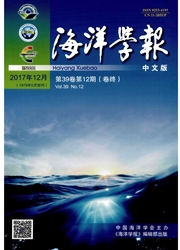

 中文摘要:
中文摘要:
基于该系列文章前文研究中构建的海气耦合气候模式和所揭示的北大西洋热盐环流年代际振荡机制,针对海气要素对该振荡机制的影响问题进行了重点的探讨。为细致准确的研究北大西洋海洋要素同北大西洋热盐环流年代际振荡的关系,有针对性的定义了副极地海区表层密度指数和北大西洋暖流强度指数并对模式结果进行了全面分析。分析结果表明副极地海区表层密度变化领先大西洋径向翻转环流(MOC)变化7 a,北大西洋暖流的变化领先MOC变化4 a,格陵兰-苏格兰海脊溢流水强度(包括丹麦海峡溢流水和法鲁海峡溢流水,是北大西洋深层水的重要来源)的变化领先MOC的变化3 a;北大西洋大气要素变化对北大西洋热盐环流年代际振荡有非常重要的调制作用,当副极地流环和北大西洋暖流(NAC)达到最强的2 a之前,高纬度地区大气为气旋式环流异常,中纬度地区大气为反气旋式环流异常,海表热通量在大西洋副极地海区是负异常,这都有利于副极地流环和NAC的加强,更多高盐度的北大西洋水进入格陵兰-冰岛-挪威海(GIN)海域,由此可以导致GIN海域表层密度上升,使水体的层结稳定性减弱,有利于深层对流的发生,同时大气变化通过风应力旋度和海表热通量也直接影响GIN海域深层水的生成,进而导致格陵兰-苏格兰海脊溢流水的强度增加。
 英文摘要:
英文摘要:
Using the advanced climate ocean-atmosphere coupled model described in the first paper of this series of studies,response analyses of inter-decadal variations of the Atlantic thermohaline circulation by ocean-atmosphere elements were deliberated.For studying the relationship between the ocean elements of the North Atlantic and inter-decadal variations of Atlantic thermohaline circulation,subpolar sea-surface-density index(SSI) and North-Atlantic-Current Strength Index(NSI) were defined and analyzed.The results of analyses indicate that SSI changes 7 years earlier than Atlantic meridional overturning circulation(MOC) while NSI changing 4 years earlier than MOC.The strength of water overflows from Greenland-Scotland sea ridge(including Denmark Strait and Faro Strait),which is an important water resource of North Atlantic deep water,changes 3 years ahead MOC.The inter-decadal variations of Atlantic thermohaline circulation THC are influenced by North Atlantic atmosphere elements significantly.2 years before subpolar current and North Atlantic Current(NAC) reaching their full strength,High-latitude atmosphere is abnormal in the pattern of cyclonic circulation and middle-latitude atmosphere is abnormal in the pattern of anticyclonic circulation.Meanwhile,the sea surface heat flux in Atlantic subpolar sea area is negative anomaly.All of those abnormal conditions enhance the strength of subpolar current and NAC.More water with higher salinity intruding into Greenland-Icelandic-Norwegian Sea(GIN) brings higher sea surface density of GIN.This weakens the stability of water stratification and increases the probability of occurrence of deep convection.Meanwhile,the variation of atmosphere influences the deep water generating process in GIN by the curl of wind stress and sea surface heat flux.Then the strength of water overflows from Greenland-Scotland sea ridge is strengthened.
 同期刊论文项目
同期刊论文项目
 同项目期刊论文
同项目期刊论文
 期刊信息
期刊信息
